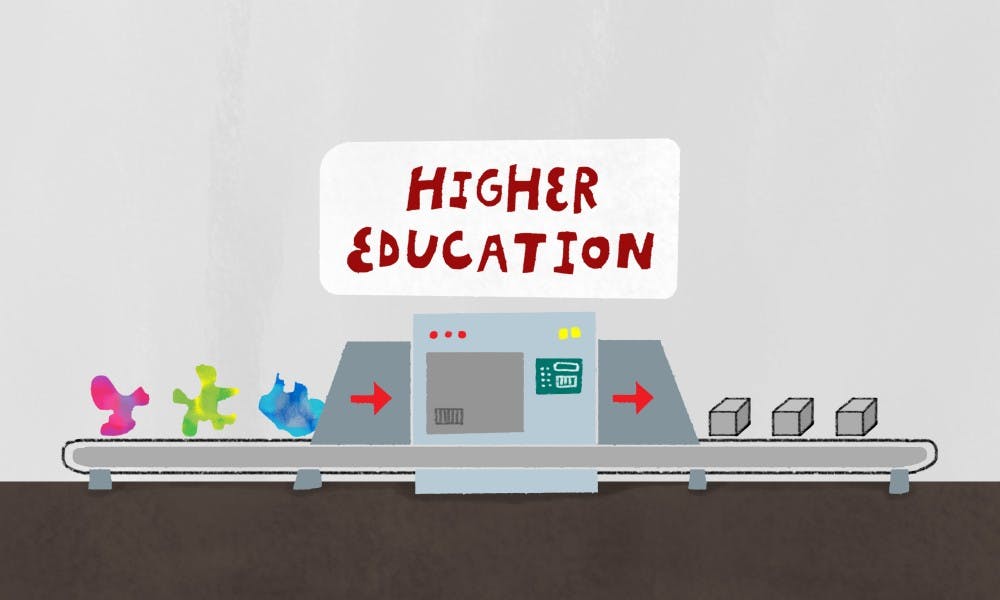You are nine years old. Your mom comes into your room at 6:30 a.m. to wake you up. You climb out of bed, brush your teeth, have breakfast, then run to the bus stop. The driver yells at you to hurry up. You sit silently as the bus loops around the blocks, bringing you to school right before the first bell.
Five classes in the morning. Three in the afternoon. Your dad picks you up at 4:30 p.m. and drops you off at the tutoring center. Five of the kids in your class go to the same tutoring center as you do. After tutoring, you go to piano lessons. Your teacher praises you for technique but says your pieces lack emotion. You get home at 8, then do homework until 10. You want to watch TV, but your mom reminds you it’s a school night. Begrudgingly, you go to bed.
Such was the case for a majority of my friends in elementary school back in China. Our daily lives consisted of little else except for classes and after-school tutoring. There was no time to run around, no sleepovers, no playing soccer with friends in the backyard. The “Gaokao” — China’s National College Entrance Examination — loomed over us the day we walked into school.
After every math test, my teacher would post a list of rankings. Scores were omitted, but student names were listed in order of performance. I used to obsessively check these rankings and count how many names were before mine. Seeing a long list of names underneath my own gave me satisfaction that I was “superior.” If I could just score three points higher, I would eliminate more of my competitors. And in my head, my friends were my competitors too — especially since my parents constantly reminded me that “the Hannah you always hang out with” is getting “A-pluses” on all her English tests, or that “David from next door” had passed the highest level of piano examination when he was 10 years old.
As I progressed through middle school and began to form deeper and more meaningful friendships, the idea of attempting to outcompete people who excel in different areas than I do grew absurd. My best friend in middle school loved art and English — subjects that her parents deemed a waste of time, but ones I found to be incredibly fascinating. Therefore, it pained me to watch her spend over two hours every night on STEM classes that she loathed, while her artistic talents went unrecognized by the testing system that China had meticulously set up.
As the semesters progressed, I stopped checking my class rankings and grew progressively annoyed when asked about my exam scores. The previous triumph of “defeating” other kids in my class no longer excited me. Therefore, when my parents discussed with me the possibilities of going to boarding school in the United States, I was thrilled by the prospect of a more varied and customizable array of knowledge, and accepted their proposal without hesitation.
However, it was not until I developed an understanding for the methods in which U.S. universities admit students that I recognized the irony in my choice of schooling. Colleges here decide upon members of their next class solely based on a couple of essays, quantified and oftentimes inaccurate representations of academic aptitude, and background questions regarding family and income.

SEE MORE FROM LILIAN ZHANG:
From Beijing to Philadelphia, gentrification follows me across the globe
As a freshman, I cannot even claim to holistically understand any of the people I have befriended at Penn yet — coming to comprehend the character of a person requires a substantial amount of time. It is therefore slightly absurd that colleges advertise their admissions process using this word — there is simply no way to completely understand any student from a few pages of paper. To falsely claim a holistic application can become a defeating concept as well. It also invalidates students who are rejected during the application process. Being denied entrance to an institution for not being a good enough person as a whole is drastically more defeating than being rejected simply for grades.
As I delved deeper into the process of college admissions, it becomes even more apparent that the idea behind the “Gaokao” that I had loathed is almost perfectly replicated and implemented here, only in a milder form. A low score on the SAT or ACT can often mean a guaranteed rejection letter. This encourages students to obsess over GPA and standardized test scores as they strive toward the outlines of a perfect applicant. Many high school students obtain internship positions that would be much more valuable if conducted during their undergraduate years, solely because such positions look glamorous on a resume. Many take on leadership roles even though they might not naturally gravitate to organizing whole teams and large-scale events.
I came to the United States so that I would avoid falling victim to an education system based on standardized and rigid deliverance of knowledge. It is undeniable that there is a lot more academic freedom in universities here, yet these dogmatic evaluation methods are far from holistic. The U.S. admissions process has much more in common with China’s than they’d like to admit. I thought I had escaped, but such inflexibility has only followed me here to Penn.

LILIAN ZHANG is a College freshman from Beijing studying the biological basis of behavior and Hispanic studies. Her email address is lilzhang@sas.upenn.edu.
SEE MORE FROM LILIAN ZHANG:
From Beijing to Philadelphia, gentrification follows me across the globe









